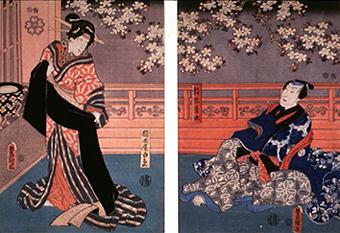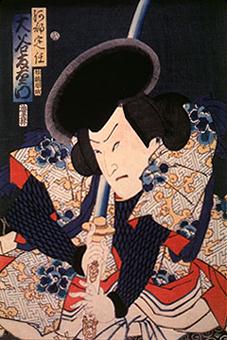THE ACTOR'S IMAGE
The C. Coleman McGehee Collection of Ukiyo-e Prints
 "ACTORS SUZUKI MONDO AND HASHIMOTOYA
SHIRAITO"
"ACTORS SUZUKI MONDO AND HASHIMOTOYA
SHIRAITO"
by Utagawa Toyokuni III
pub. date 1852. Woodblock print; ink and color on paper
Japanese woodblock prints, also known as ukiyo-e, were the
most popular art form in the Edo period (1603-1868) in Japan.
These prints could be produced rapidly, relatively inexpensively,
and in large quantity,
thus making them exceptionally responsive to the increasing and
changing demand of the urban society that patronized and influenced
art and theater. The kabuki, which incorporated singing, dancing
and acting, developed side by side with ukiyo-e. As memorable
plays and performances inspired print artists, the prints in
turn promoted the actors, as well as their costumes, make-up
and acting styles. The 100 prints of the C. Coleman McGehee Collection,
on long-term loan from the Japan-Virginia Society, represent
the prodigious bodies of work of the Utagawa School, including
Toyokuni III, Kunisada II and Hiroshige. These compelling images
pulsated with vibrant colors, dramatic actions and intense emotions.
They open a window on the fascinating life of 19th-century Japan.
 "ACTOR OTANI TOMOEMON as kawabe
Sadanori",
"ACTOR OTANI TOMOEMON as kawabe
Sadanori",
Utagawa Scool; pub. date: 1865
Woodblock print; ink and color on paper
|

